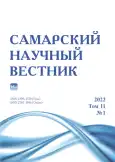Methodological features of the study of «combat films» in the United States of 1941-1945
- Authors: Buranok S.O.1
-
Affiliations:
- Samara State University of Social Sciences and Education
- Issue: Vol 11, No 1 (2022)
- Pages: 246-249
- Section: Historical Sciences
- URL: https://journals.rcsi.science/2309-4370/article/view/108351
- DOI: https://doi.org/10.55355/snv2022111215
- ID: 108351
Cite item
Full Text
Abstract
In modern studies on the history of wars, a fairly popular direction is the study of information discourse specifics. A special role in this discourse is played by propaganda through cinematography, which uses images, historical symbols and stable metaphors, the appeal to which can form a certain public reaction. The study of the main aspects of this topic is impossible without recourse to interdisciplinary methods of the humanities, developed as a result of a number of «turns» in the development of modern humanitarian knowledge, including «anthropological», «linguistic», «cultural», calling to study the perception of the world, human behavior in the past in the totality of socio-economic, political, cultural practices adopted in the studied society at a given time. In addition, an appeal to the methods of historical imagology will make it possible to trace the evolution of the process of visualization and mythologization of the Second World War in US cinematography more accurately. Without the study of the basic principles, methods, mechanisms and tools of this process it is extremely difficult to understand the peculiarities of the development and interaction of cinema and US propaganda at subsequent historical stages and the present. American scientists have achieved significant results in the study of directors’ creative biographies, in the specifics of their interaction with federal government bodies, and in the analysis of the activities of the Office of War Information in the field of cinematography.
Full Text
##article.viewOnOriginalSite##About the authors
Sergey Olegovich Buranok
Samara State University of Social Sciences and Education
Author for correspondence.
Email: witch-king-1@mail.ru
doctor of historical sciences, associate professor, professor of World History, Law and Methods of Teaching Department
Russian Federation, SamaraReferences
- Basinger J. The World War II combat film. Middletown: Wesleyan University Press, 2003. 372 p.
- Neale S. Genre and Hollywood. New York: Psychology Press, 2000. 336 p.
- Eberwein R. The war films. New York: Rutgers University Press, 2004. 240 p.
- Browne N. Refiguring American film genres: history and theory. Los Angeles: University of California Press, 1998. 347 p.
- Suid L. Guts and glory: the making of the American military image in film. Lexington: The University Press of Kentucky, 2002. 768 p.
- Allison T. Screen combat: recreating World War II in American film and media. Pittsburgh: University of Pittsburgh Press, 2001. 380 p.
- Koppes С., Black G. Hollywood goes to War: how politics, profits and propaganda shaped World War II movies. New York: University of California Press, 1990. 384 p.
- Winkler A. The politics of propaganda: the office of War information, 1942-45. New Haven: Yale University Press, 1978. 230 p.
- Doherty T. Projections of War: Hollywood, American culture, and World War II. Washington: Columbia University Press, 1999. 381 p.
- Kane K. Visions of war: Hollywood combat films of World War II. New York: UMI Research Press, 1982. 170 p.
- Hoopes R. When the stars went to War: Hollywood and World War II. New York: Random House, 1994. 256 p.
- Chambers J. World War II, film, and history. Oxford: Oxford University Press, 1996. 208 p.
- Anderson D.K. John Ford. New York: UMI Research Press, 1972. 412 p.
- Bogdanovich P. John Ford. London: Studio Vista, 1967. 284 p.
- Baxter J. The cinema of John Ford. London; New York: A.S. Barnes, 1971. 382 p.
- Darby W. John Ford's westerns: a thematic analysis, with a filmography. New York: McFarland & Company, 1996. 317 p.
- Gallagher Т. John Ford: the man and his films. Berkeley: University of California Press, 1988. 600 p.
Supplementary files






